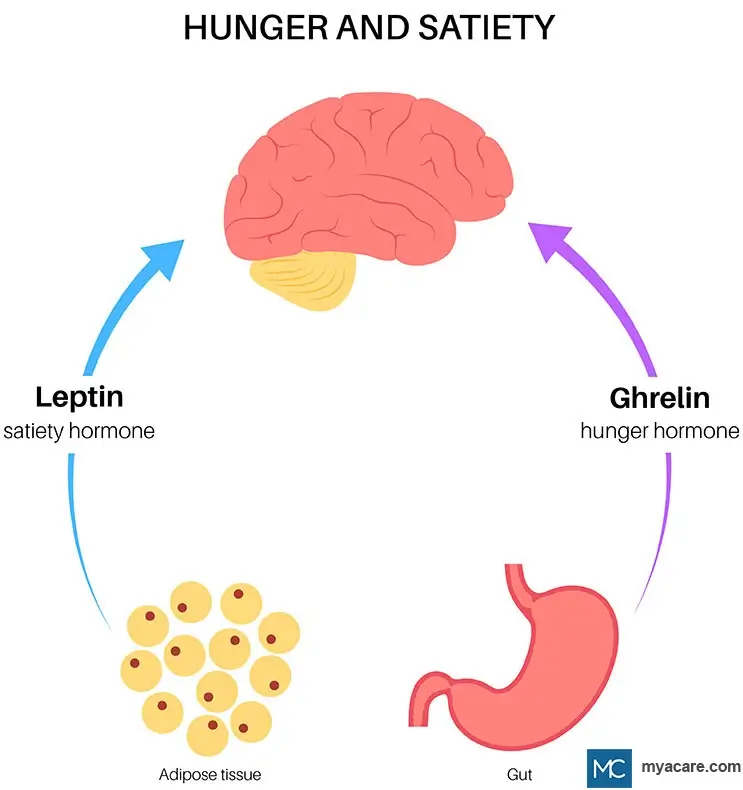What Is Ghrelin?

Medically Reviewed by Dr. Sony Sherpa (MBBS) - May 27, 2022
Ghrelin which is also known as the hunger hormone plays a vital role in the maintenance of our daily diet. Not only that it has many more functions. From the regulation of appetite to its role in heart disease and cancer, it seems that this hormone has much more down its sleeve.
So, how does this hormone achieve this? Scroll more to find out.
What Is Ghrelin?
Ghrelin is a hormone that is produced by the stomach. Contrasting to other secretions of the gastrointestinal tract, ghrelin is different in the sense that it promotes appetite and hunger. (1) Because of this property of increasing appetite and hunger, ghrelin has also been named an orexigenic hormone. (1)
Where Is Ghrelin Produced?
Ghrelin hormone is mainly produced by specific types of cells known as PD/D1 in your stomach. However, other organs and parts of your body like your pancreas, small intestine, and brain also secrete ghrelin. This amount is far less than that produced by the stomach. (1)
How Does The Ghrelin Hormone Work To Promote Hunger?
Ghrelin is produced once the stomach is empty. With the help of the bloodstream, it reaches a part of your brain known as the hypothalamus. Ghrelin can also travel to the brain with the help of a nerve known as the vagus nerve. (2) Local production of ghrelin in the hypothalamus has also been noted. (3)
Hypothalamus has various key functions in our body. Among them, one is to regulate and coordinate your hunger. This is done by structures within the hypothalamus known as hypothalamic nuclei. Arcuate, ventromedial, paraventricular, and lateral hypothalamic nuclei are the structures involved. (4)
The ventromedial hypothalamus is responsible for the satiety or the feeling of being full after eating, whereas the lateral hypothalamus is responsible for hunger. Similarly, the arcuate nucleus and paraventricular nucleus also play significant roles in the overall hunger-satiety management. These nuclei coordinate with one another and maintain the hunger and satiety balance amongst various other factors. (4)
Once ghrelin reaches the hypothalamus, by exerting its effect, it promotes hunger and increases appetite. (1, 3)
What Are The Functions Of Ghrelin?
Besides a major role in managing hunger and satiety, ghrelin has other important functions. It has also been linked to the working and functioning of various other systems in our body.
Some of the key functions of ghrelin are (1, 2, 3, 6)
- Signaling the hypothalamus to increase appetite and promote hunger.
- Helping in the promotion of fat storage in the body.
- Stimulating the release of growth hormones from a gland known as the pituitary gland.
- Stimulating your digestive system to move food throughout the length of the digestive tract. This includes the passing of food from your stomach through your small and large intestines.
- Contributing to how the insulin is released.
- Protecting the health of your heart and the blood vessels.
- Playing an important role in helping maintain glucose homeostasis
- Helping in energy homeostasis
- Ghrelin has protective effects on muscular atrophy and can prevent muscle mass
- Ghrelin has some role in bone metabolism
- Ghrelin has been associated with cancer development/progression. This property can be useful in targeting anti-cancer therapy using a new approach.
What Causes The Rise And Fall of Ghrelin?
There are various factors that determine the level of ghrelin. Ghrelin levels changes in our body depending on the time, scenario, or any other underlying disease condition. (2, 3)
Usually, ghrelin levels increase when your stomach is empty. This will relay the message to the brain and will encourage eating food. Once you eat the ghrelin levels fall. (1, 2, 3) This type of mechanism is also called a feedback mechanism, as the next step is determined based on the feedback received.
That being said, matters of the human body are not so simple after all. There are certain conditions where you can have either high or low ghrelin levels.
High Ghrelin Levels
Normally, people may have an increase in ghrelin levels if the food they consume is less in amount or technically low in calories. A good example would be people who are on a restrictive diet for fat loss.
However, there are various other causes associated with high ghrelin levels. These causes can be due to a number of biological and genetic conditions such as (3, 5, 6)
- Inflammatory bowel disease (IBD).
- Coeliac disease.
- Anorexia nervosa.
- Cachexia, is a condition that causes your muscles to waste away.
- Prader-Willi syndrome.
Low Ghrelin Levels
Ghrelin levels are usually low in people who are obese or have significant fat reserves in their bodies. Certain gastrointestinal diseases are also associated with low ghrelin. Some of them are (3, 5, 6)
- Chronic gastritis.
- Functional dyspepsia.
- Helicobacter pylori infection.
- Irritable bowel syndrome (IBS).
Do Leptin And Ghrelin Have The Same Functions?
While ghrelin primarily promotes hunger, leptin does the exact opposite. Ghrelin and leptin are two of many hormones that control your appetite and fullness. (3) To make things easily understandable, you can consider them to be the “Ying and Yang” of hunger and satiety management. Although, they act completely different and are completely different in their functioning and long-term effects.
Ghrelin is made in your stomach and signals your brain when you’re hungry. Whereas, your fat cells produce leptin. Once your fat stores start getting full they release leptin. Leptin then conveys the message to the brain and as a result your hunger decreases and you get the general feeling of feeling full. More and more research has shown that obese people are turning out to be resistant to leptin. This can be an important reason for overeating and more fat being accumulated. (1, 2, 3)
Ghrelin in a way plays a short term role in appetite control while leptin controls long-term weight control. (3)

How to Increase Leptin and Decrease Ghrelin?
Things in the human body are not as simple as flicking a switch for the desired effect. There are many factors intertwined to produce the same result. There are no magic pills or drugs that can magically increase or decrease the levels of ghrelin and leptin. (3)
That being said, you can keep ghrelin, leptin and other hormone levels healthier by modifying general lifestyle practices and approaching a healthier lifestyle. Some of these practices are (1, 2, 3, 5, 6)
- Limiting the consumption of processed foods, especially foods high in sugar, high-fructose corn syrup and salt.
- Avoiding practises where you gain and lose weight frequently.
- Eating a diet which is high in healthy carbohydrates, such as whole grains and lean proteins, like chicken or fish.
- Getting proper sleep. This can vary from person to person. Usually, at least seven to eight hours a night is sufficient.
- Staying hydrated by drinking plenty of water and eating water-filled foods such as fruits and vegetables.
- Controlling the level of stress
- Maintaining a stable weight
You have to keep in mind that these practices are not for everyone. If you have certain underlying diseases like diabetes or digestive issues like IBS, gastritis, or gastric ulcer, it is best you consult your doctor first.
Takeaway
Ghrelin is an essential hormone with its effects and role in various systems other than hunger management. An increase in ghrelin level promotes hunger and appetite whereas the ghrelin level falls when you are full.
Ghrelin has a short term meal based feedback mechanism, whereas leptin is responsible for long term weight management. Nevertheless, both ghrelin and leptin play a significant roles in the management of hunger and satiety.
To search for the best Gastroenterology healthcare providers in Germany, India, Malaysia, Spain, Thailand, Turkey, Ukraine, the UAE, the UK and The USA, please use the Mya Care Search engine.
The Mya Care Editorial Team comprises medical doctors and qualified professionals with a background in healthcare, dedicated to delivering trustworthy, evidence-based health content.
Our team draws on authoritative sources, including systematic reviews published in top-tier medical journals, the latest academic and professional books by renowned experts, and official guidelines from authoritative global health organizations. This rigorous process ensures every article reflects current medical standards and is regularly updated to include the latest healthcare insights.

Dr. Sony Sherpa completed her MBBS at Guangzhou Medical University, China. She is a resident doctor, researcher, and medical writer who believes in the importance of accessible, quality healthcare for everyone. Her work in the healthcare field is focused on improving the well-being of individuals and communities, ensuring they receive the necessary care and support for a healthy and fulfilling life.
Featured Blogs



